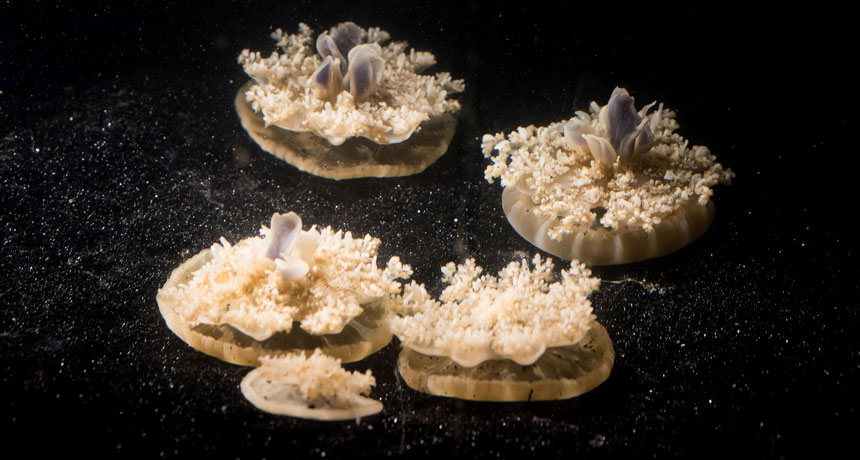Surprise! Some jellyfish appear to need their zzz’s
Experiments suggest these creatures are the first brainless animals to snooze

Cassiopea jellyfish can often be found upside-down. A new study finds that they may regularly enter a sleeplike state while in that position.
Caltech
The life of a jellyfish may seem like a real snooze. Until now, though, biologists were never certain if the gelatinous blobs actually slept. Now it appears that at least one group of jellyfish needs its beauty sleep just like us.
Some species of upside-down jellyfish (Cassiopea) meet all of the criteria for entering a “sleeplike state,” a new study finds. It appears September 21 in Current Biology. The jellyfish seem groggy after a sleepless night. And they quickly waken when fed, tests show.
Sleep and sleeplike states have been documented in a wide range of animals. These states have been found in creatures ranging from microscopic wormlike nematodes to, of course, humans. But until now, the behavior has been observed only in animals with a centralized nervous system and brain. These jellies lack both. That’s what makes the new findings such a surprise.
Jellyfish operate on a decentralized net of nerve cells. “It’s the first animal that doesn’t have a centralized nervous system that also sleeps,” says Ravi Nath. At least, he notes, they’re the first his team knows of. Nath is a graduate student in biology. He and the rest of his team work at the California Institute of Technology in Pasadena. “Sleep is not solely generated by animals with brains,” Nath concludes.
The finding is raising new questions about when — and why — sleep evolved. Though sleep has been linked to improving memory in complex animals, such as people, the same can’t be said of jellies. Jellyfish are cnidarians (Nih-DAIR-ee-uns). This ancient line of animals evolved at least 542 million years ago. So if Cassiopea do sleep, that would suggest such rest is among the most basic needs in animals.
“Finding sleep in jellyfish thus raises the question of whether sleep and nervous-system functions are intertwined,” says William Joiner. He is a neuroscientist at the University of California, San Diego. Perhaps instead, he posits, sleep might have emerged in animals before the nervous system (including brain).” If true, he says, it might “fulfill an as yet unidentified physiological need.”
Upside-down jellyfish spend most of their time with their gelatinous bodies, or bells, sitting on the seafloor. This leaves their stubby arms and tentacles sticking up. The animals regularly pulse their bells to filter food from the water and to get rid of wastes.
Three questions
To qualify as sleeping beings, the jellyfish had to pass three tests. First, did they become less active at a particular time? To find out, the research team monitored the pulsing of 23 upside-down jellyfish. They observed them day and night for six days.
The animals pulsed 32 percent less at night, the researchers learned. The team could easily reverse this sleepy state by dropping food into the tank. “The jellyfish immediately responded,” Nath says, by starting to pulse more.
Second, did these jellies respond less while in their sleeplike state? The human equivalent would be the fact that while sleeping, “You are less likely to respond to someone talking to you,” explains Michael Abrams. He was a coauthor on the new paper.
Cassiopea prefer to swim down to settle on a surface. So the researchers hoisted up a jellyfish in a plastic pipe with mesh on the bottom. They then let the animal settle for five minutes. Afterward, they quickly lowered the pipe. That action effectively placed the jellyfish free-floating into the water column. At night, the researchers found, it took the jellyfish longer to begin pulsing and reach the bottom of the tank than during the day.
Finally, do these jellyfish need regular periods of sleep in order to survive? The researchers kept the jellyfish active for up to 12 hours overnight by squirting them with pulses of water. The jellyfish were significantly less active the next morning. That shows the jellyfish needed to make up for the loss of rest, explains Claire Bedbrook. She also worked on this project.
“The authors do a good job of demonstrating that jellyfish fulfill the most fundamental criteria for sleep,” Joiner concludes.
A bigger question for cnidarians, and most animals, is not only if they sleep, but why. Sleep in jellyfish can hardly be compared to human sleep, Abrams says. However, by studying these creatures “we might be able to get at those core, fundamental components of why something sleeps.”







